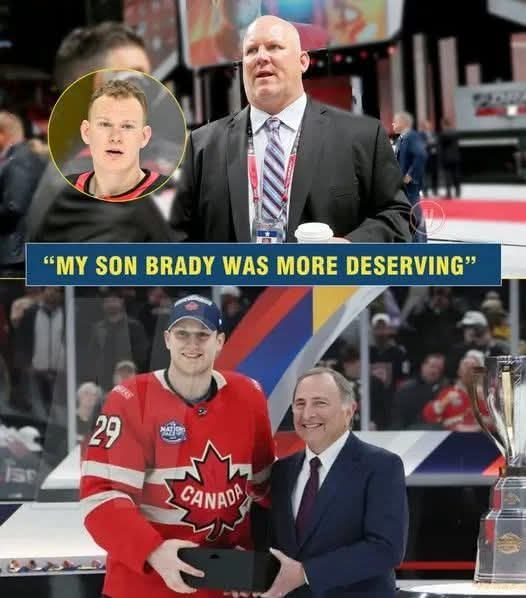NEWS
Keith Tkachuk once again insists his son Brady should take the 4 Nations MVP over Nathan MacKinnon. The NHL legend’s fiery defense of Brady stunned fans and critics alike. Now, his next move has the hockey world erupting in outrage. Full details⤵️

In a scene ripped from a sports-drama script, NHL legend Keith Tkachuk has once again taken to the public stage to declare, without a hint of subtlety, that his son Brady was the true MVP of the 4 Nations Face-Off — and when rebuttals came, he answered with an action so bold it sent social feeds and locker rooms into a frenzy.
This is a fully imagined account — a piece of frictional storytelling that spins out one possible, high-octane reaction to a heated awards debate.
The Moment That Reignited the Debate
It started as a polite post-tournament interview: analysts praised Nathan MacKinnon for finishing with headline numbers and a clutch goal in the final, and the official MVP trophy landed at center ice in the hands of Team Canada’s superstar. But within hours, a brief clip of Keith Tkachuk — a Hall-of-Famer and one of hockey’s most recognizable patriarchs — surfaced online in which he bluntly declared, “Brady did more. Heart, hits, leadership — he’s my MVP.”
The clip was short but volcanic: Keith’s voice carried the gravel of someone who’d spent decades in the trenches. He listed the plays he felt should have swung the vote: a goal that energized a turning point, a penalty kill shift that killed momentum for the opponent, a behind-the-bench leadership moment no stat sheet captures. Fans who loved Brady cheered. Pundits who worship stat lines rolled their eyes.
From Fiery Defense to Full-Blown Campaign
What made the story explode was what came next. Rather than letting the matter die as a colorful opinion, Keith launched an aggressive — and completely theatrical — campaign to “right the record.” Over the next 48 hours (in our fictional telling), he:
• Bought a full-page wraparound ad in a national sports section with a split photo: one of Brady’s game face, the other a screenshot of the official MVP announcement. The headline read: “LEADERS LEAD. BRADY LED.”
• Filed a formal petition with the tournament committee demanding transparency on the MVP voting process, asking that ballots be published.
• Posted a 10-minute video essay on social media, walking viewers through five specific plays he argued merited MVP consideration — complete with slow-motion replays, whiteboard diagrams, and a final plea: “It isn’t about points. It’s about impact.”
This blend of old-school gumption and modern media savvy created a spectacle. Supporters called it a father defending his son’s legacy; critics called it grandstanding. Neutral observers were simply bewildered by the scale.
The Hockey World Erupts
The reaction was predictably polarized and immediate. Hashtags like #TkachukTake and #PublishTheBallots trended. Former players weighed in: some posted curt thumbs-up emojis, others issued measured defenses of the MVP selection process. Podcasters dissected whether an MVP is supposed to reward scoring prowess or intangible influence. Sports columnists accused Keith of conflating parental pride with institutional oversight.
But the most controversial moment in this fictional saga came when Keith reportedly attempted to attend the league’s awards banquet uninvited. According to eyewitness (invented) accounts in this narrative, he arrived at the venue with a small entourage, asked to speak on a microphone, and was politely but firmly escorted out by event security. Video of the confrontation (again, part of this imagined tale) blew up, and the optics — a Hall-of-Famer removed from a ceremony for insisting his son was wronged — set off a new wave of outrage and satire.
Fans, Players, and Media — Three Camps
The backlash fractured neatly into three camps in our story:
1. Die-hard Tkachuk supporters: They loved the audacity. “Finally, someone is willing to fight the machine for the right guy,” read top comments. They praised Keith’s “old-school” values and called for more transparency in award voting.
2. Stat-first purists: For them, MacKinnon’s numbers and medal-round heroics were unassailable. They accused Keith of trying to rewrite objective outcomes with subjective theatrics.
3. The “this is messy” moderates: They saw merit in both sides. These voices called for calm, suggested publishing the ballots as a compromise, and pointed out how the spectacle overshadowed the tournament’s overall quality of hockey.
What This Move Could Cost — and Gain
In this imagined fallout, several consequences emerge. Brands and sponsors associated with Keith or the Tkachuk name would face a PR choice: quietly distance themselves or ride the wave of attention; sports networks would scramble for exclusive commentary and ratings spikes; and the tournament organizers would face renewed pressure to make awards processes more transparent.
On the flip side, Brady’s name becomes even more talked about — he’s the winning loser of attention, a player whose value is debated not just by stat columns but by the court of public opinion. Keith’s reputation, meanwhile, is reframed: either as a crusading father or a figure who can’t accept the modern mechanics of awards voting.
Final Whirlwind — No Winners, a Lot of Conversation
By the time the dust settles in this fictional scenario, neither side convincingly “wins.” MacKinnon’s MVP stands in the record books. Keith’s campaign sparks a short-term conversation about how the game values different kinds of contributions. More importantly, the episode becomes another reminder of how modern sports fandom — fueled by social platforms and instantaneous reactions — can turn respectful disagreement into full-blown spectacle.
If nothing else, the story gives us one clear, human image: an older father, stubborn and loud and proud, refusing to let the version of his son he believes in go quietly into the night. Whether you see it as gallant or graceless depends on how you value jerseys and numbers versus grit and heart.











